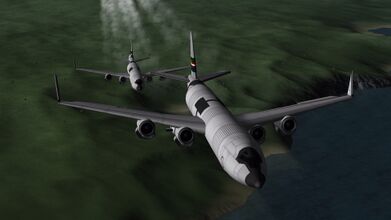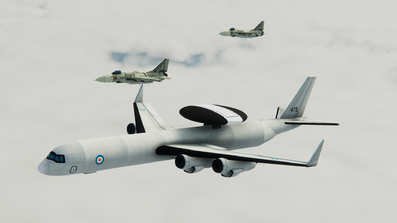KZ-10A Paladin: Difference between revisions
No edit summary |
mNo edit summary |
||
| (28 intermediate revisions by 3 users not shown) | |||
| Line 1: | Line 1: | ||
| − | {{ |
+ | {{Craft|name=KZ-10A|image=IMG 4736.jpg|imagedesc=KZ-10A Refueling [[Z-80 Fox]]es in flight.|type=Aerial refueling craft|origin=[[Zokesia]]|designer=[[Ward Industries]]|prod_start=2084|prod_end=2086|design_start=May 2083|serv_start=August 2084|built=18|cost=51,260|full_name=Ward Industries KZ-10A Paladin|operators=[[Arcovii-Zokesia]], [[Radivosa]], [[Konig]], [[Surnay]], [[Radivosa]]}} |
| ⚫ | |||
| − | Konig |
||
| + | == Development == |
||
| − | Surnay |
||
| + | Initially built to extend the range of Arcovii-Zokesian aircraft to meet the requirements of extended conflict across Kerbin, the KZ-10 first flew in 2084, with additional aircraft delivered over the next two years. The aircraft was designed to operate both as an AWACS aircraft and a tanker, allowing interchangeability of parts in wartime enviornment. The production run was halted after 18 aircraft. |
||
| ⚫ | |||
| + | == Design == |
||
| − | [[File:IMG 4738.jpg|left|thumb|494x494px]] |
||
| + | |||
| − | [[File:IMG 4736.jpg|left|thumb|495x495px]] |
||
| + | == Variants == |
||
| + | |||
| + | == Operational History == |
||
| + | |||
| + | === Initial Service === |
||
| + | Initial reviews found the KZ-10 was well liked by its crews. Of the 18 built, four were exported to Surnay and Radivosa, with the rest retained for Zokesian use. The Radivosa deliveries were in turn seized by Konig and used with great success by the Konig Air Force. |
||
| + | |||
| + | The KZ-10 Was used continuously from 2084 to 2122, serving the Zokeisan Air Force as its sole tanker/AWACS aircraft. With the end of the Big Three in Zokesia and a downsizing of the military, the KZ-10s were put into storage in eastern Zokesia and largely forgotten, as UIF tanker aircraft and naval refueling aircraft like the Z-5 gradually took over the roles when the military required them again in the late 2130s. Zokesian projection of power in the mid 22nd century shifted away from the air force and toward the navy with such operations as Operation Carolinas proving the Zokeisan Navy was far better equipped to fight abroad than the Air Force, although the latter still retained long range capability it was mostly limited to land based projection from Zokesia herself or Allies, none of which were within reach of north point at the time of the Reclamation. |
||
| + | [[File:IMG 4738.jpg|thumb|391x391px| KZ-10s buddy refueling over Zokeisa, 2088]][[File:ZokeScreenshot1533.png|thumb|388x388px|[[Konig]] Air Force KZ-10 in hangar with ground units of the Konig Self Defense Force, 2089.]] |
||
| + | |||
| + | === 22nd Century Refit === |
||
| + | [[File:ZokeScreenshot15145.png|thumb|397x397px|Konig Air Force KZ-10 in formation with F-61 Condors, 2135.]] |
||
| + | [[File:ZokeScreenshot9127.png|thumb|395x395px|KZ-10A SLEP III refueling a [[Z-117 Blackout II]], 2198]] |
||
| + | In 2169, the need for additional refueling aircraft came when the evacuation of Arvene began across the ocean. The KZ-10As remaining in the boneyards of eastern Zokesia were pulled out of storage and refitted. Four aircraft became fully operational, with the rest becoming useable for spares. They participated in 123 sorties over the following year, until entering semi-retirement and use as testbed aircraft for newer refueling prototype booms and Advanced Fighter aircraft. |
||
| + | |||
| + | In 2180, 21 S-99 Airliners were retrofitted to KZ-10A standard to meet the demands of the Zokesian Air Force, which was once again without a suitable tanker after the failure of the [[T-133 Super Redhead]] to meet operational needs. Now powered with four turboprop engines instead of low-bypass ratio jet engines, the KZ-10A SLEP III was able to operate at far more flexiable speeds than the T-133, and with increased fuel storage for extra time on station. All four surviving KZ-10As were converted, with two being retrofitted with AWACS detection radar kits that were designed to be modular, letting the KZ-10A perform dual role with minimal airframe changes. The type was finally retired in 2185 following the introduction of the [[W-2022 Comforjet|KZ-20 Moonbow]] refueler to the Zokesian Air Force, allthough they remain in reserve storage should the need for their use once again be required. |
||
| + | |||
| + | In 2200, rumors that a SLEP IV variant was being tested at [[Ezekialgrad|Ezekialgrad Air Force Base.]] |
||
| + | |||
| + | == Comparable Aircraft by Role and Era == |
||
| + | *[[CP128 Orcaléan#M128 ARTT|M128 Orcaléan ARTT]] |
||
| + | *[[W-2000 Triumph|KZ-15 Spirit]] |
||
| + | *[[W-2022 Comforjet|KZ-20 Moonbow]] |
||
| + | |||
| + | == References == |
||
| + | <references /> |
||
[[Category:Aircraft]] |
[[Category:Aircraft]] |
||
Latest revision as of 05:59, 3 January 2026
|
KZ-10A
Ward Industries KZ-10A Paladin
|
|||||
|---|---|---|---|---|---|
| Aerial refueling craft | |||||
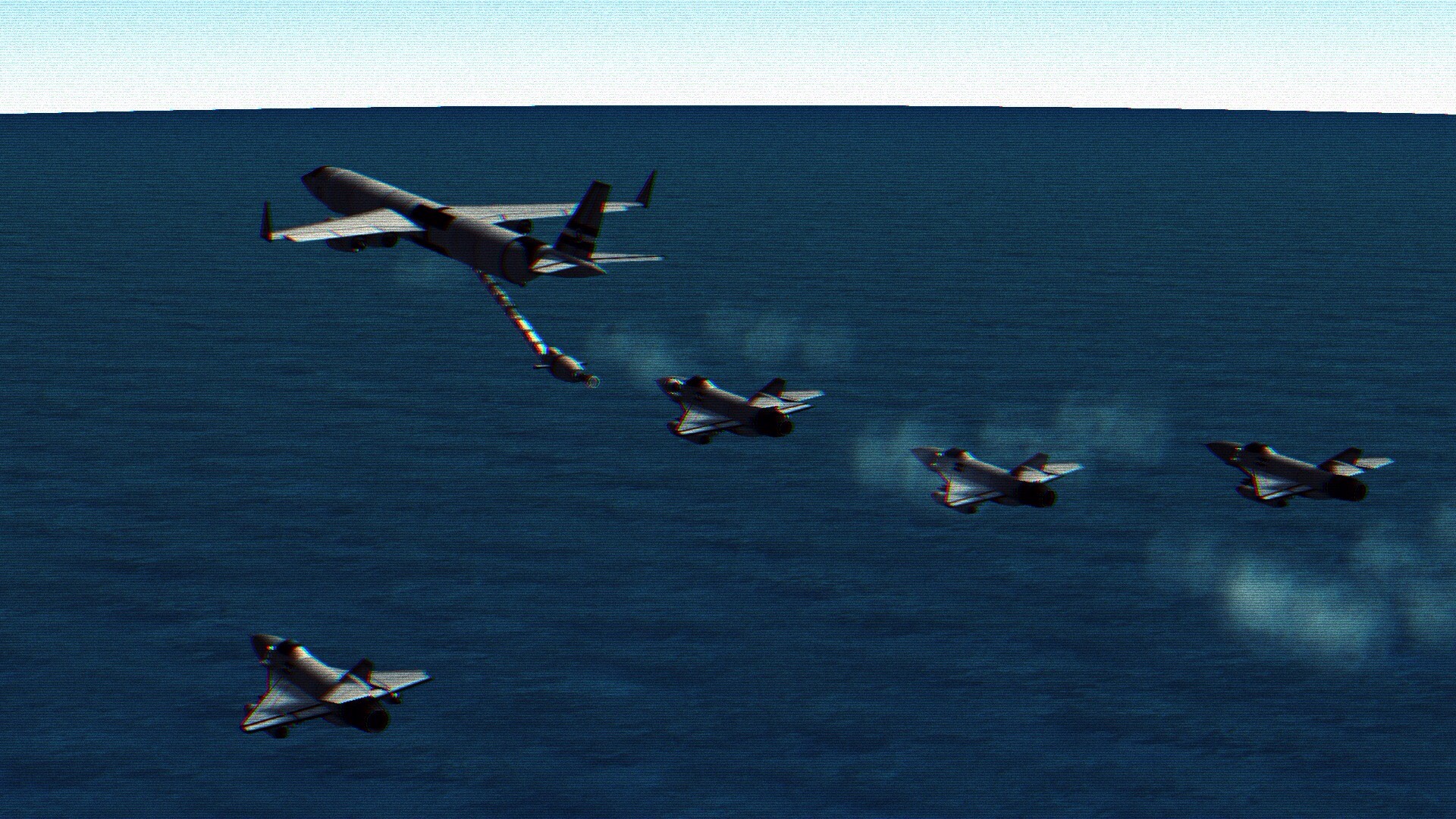 |
|||||
| KZ-10A Refueling Z-80 Foxes in flight. | |||||
| National Origin | Zokesia | ||||
| Production History | |||||
| Produced | |||||
| 2084 - 2086 | |||||
| Designer | Ward Industries | ||||
| Unit Cost | 51,260(√) | ||||
| Number Built | 18 | ||||
| Service History | |||||
| Used By | Arcovii-Zokesia, Radivosa, Konig, Surnay, Radivosa | ||||
The Ward Industries KZ-10A Paladin is a large, four engined aircraft designed to fulfill the strategic role of tanker in the Arkadii-Zokesian Air Force. It is one of two tanker designs utilized, and has been certified to refuel all Zokesian aircraft designs.
Development
Initially built to extend the range of Arcovii-Zokesian aircraft to meet the requirements of extended conflict across Kerbin, the KZ-10 first flew in 2084, with additional aircraft delivered over the next two years. The aircraft was designed to operate both as an AWACS aircraft and a tanker, allowing interchangeability of parts in wartime enviornment. The production run was halted after 18 aircraft.
Design
Variants
Operational History
Initial Service
Initial reviews found the KZ-10 was well liked by its crews. Of the 18 built, four were exported to Surnay and Radivosa, with the rest retained for Zokesian use. The Radivosa deliveries were in turn seized by Konig and used with great success by the Konig Air Force.
The KZ-10 Was used continuously from 2084 to 2122, serving the Zokeisan Air Force as its sole tanker/AWACS aircraft. With the end of the Big Three in Zokesia and a downsizing of the military, the KZ-10s were put into storage in eastern Zokesia and largely forgotten, as UIF tanker aircraft and naval refueling aircraft like the Z-5 gradually took over the roles when the military required them again in the late 2130s. Zokesian projection of power in the mid 22nd century shifted away from the air force and toward the navy with such operations as Operation Carolinas proving the Zokeisan Navy was far better equipped to fight abroad than the Air Force, although the latter still retained long range capability it was mostly limited to land based projection from Zokesia herself or Allies, none of which were within reach of north point at the time of the Reclamation.
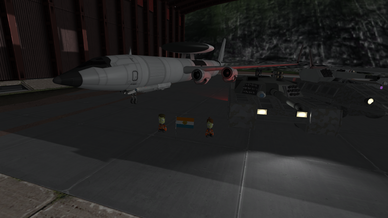
22nd Century Refit
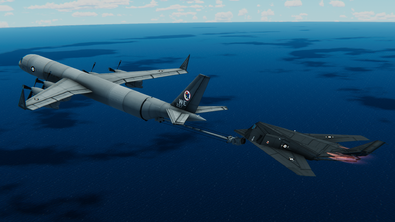
In 2169, the need for additional refueling aircraft came when the evacuation of Arvene began across the ocean. The KZ-10As remaining in the boneyards of eastern Zokesia were pulled out of storage and refitted. Four aircraft became fully operational, with the rest becoming useable for spares. They participated in 123 sorties over the following year, until entering semi-retirement and use as testbed aircraft for newer refueling prototype booms and Advanced Fighter aircraft.
In 2180, 21 S-99 Airliners were retrofitted to KZ-10A standard to meet the demands of the Zokesian Air Force, which was once again without a suitable tanker after the failure of the T-133 Super Redhead to meet operational needs. Now powered with four turboprop engines instead of low-bypass ratio jet engines, the KZ-10A SLEP III was able to operate at far more flexiable speeds than the T-133, and with increased fuel storage for extra time on station. All four surviving KZ-10As were converted, with two being retrofitted with AWACS detection radar kits that were designed to be modular, letting the KZ-10A perform dual role with minimal airframe changes. The type was finally retired in 2185 following the introduction of the KZ-20 Moonbow refueler to the Zokesian Air Force, allthough they remain in reserve storage should the need for their use once again be required.
In 2200, rumors that a SLEP IV variant was being tested at Ezekialgrad Air Force Base.
